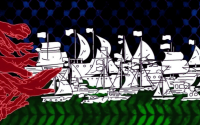4 July 2005Meera Selva
Live8 was not on the front pages of most of the newspapers and it was not broadcast live on local television. Africa woke up yesterday to a normal Sunday: people went to church, read the papers and ate lunch with their families. One thing they did not do was discuss the Live8 events around the world the day before.
"A concert?" asked Evans Konya, who was sitting in a park with his friends. "But aren't there concerts every Saturday? Why is this one special? I think I prefer to watch musicians at my local bar than at a stadium far away."
Across the continent, most of the people who were meant to feel the benefits of Live8 had not heard of the 10 concerts for Africa. Many national broadcasters did not air the concerts, so viewing was limited to those who had access to satellite channels, on a continent where people consider themselves lucky to own a radio.
The bars that did have televisions blaring in the background were tuned into CNN or Wimbledon; Venus Williams and Lindsay Davenport in tennis skirts were a particular distraction among the men.
Only South Africa, the sole African country to hold its own Live8 concert, understood the significance of the event. There, more than 20,000 fans cheered as their beloved Nelson Mandela took the stage in Johannesburg to urge world leaders to "avoid a genocide of humanity".
Not that there is a lack of awareness of the issues. In Saturday's crisp winter sunshine, hundreds of people in Nairobi's city centre park sat on the grass and watched acrobats, singers and dancers perform at Kenya's "Make Poverty History" rally. They accepted the white wristbands being handed out by aid agencies and clapped as a brass band marched past carrying a banner accusing the World Trade Organisation of stealing their futures. Everyone had suggestions of possible solutions for Africa's problems. None of them involved pop music.
"What are the musicians going to do?" asked Queen Amene, who had come to the Nairobi rally with her work colleagues. "Will they send us their money? The politicians can hold meetings to decide to give us loans or help us clear our debts but concerts are for fun, not business. Even if it were here, I would not go; I have to look after my children."
Kenya sees itself as an African success story. It has managed to hold peaceful elections, build a significant tourist industry and maintain good relations with the West. And even though it still has the usual cluster of problems, from a rising incidence of HIV/Aids to famine in parts of the country, Kenya was deemed too successful to qualify for debt relief at the last meeting of G8 ministers.
Most Kenyans see that as something to be proud of. "We are not beggars so we don't need to be treated like that," Mr Konya said. "Some help with development will be useful but before rich countries send us money, they should take time to truly understand us. There is so much corruption here that funds from overseas often go straight into the pockets of politicians. We must find a way to give aid money directly to the small people. Will the people at this concert understand all that?"
Across the continent there was a feeling that pop music is for children but debt relief, aid and trade are matters for adults. Teenagers who may have wanted to watch the concerts were deterred because most of their favourite, African musicians were not given top billing, except in South Africa and Cornwall.
In Africa, people are obsessed with politics. Governments still have the power of life or death over most of its citizens, and war and famine never seem to be far away. In impoverished Burkina Faso, the media have been more concerned with reporting developments ahead of elections in October, although national television broadcast extracts from Live8 on the one o'clock news yesterday.
In Nigeria, West Africa's economic powerhouse, there was more talk of the cancellation of $20bn of the country's debt by the Paris club of donor countries before the G8 summit than of the Live8 concerts.
The two main publications in Kenya were filled with domestic politics. The Sunday Standard led with the headline "Why our MPs are the laziest on the continent," and the Sunday Nation had a story about splits in the opposition parties. The Live8 concert was buried at the bottom of the foreign pages, where all news about distant places and strange people often appears.
http://news.independent.co.uk/world/africa/article296701.ece






